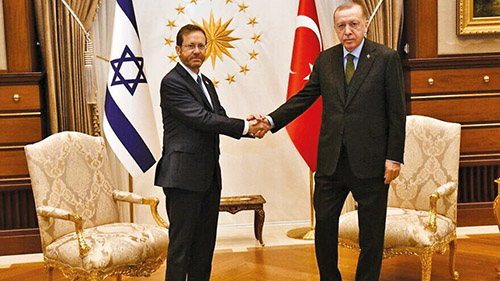
‘Upgrading relations will contribute to deepening ties between the two peoples, expanding economic, trade and cultural ties and strengthening regional stability,’ said Israeli Prime Minister Yair Lapid.
Israel and Turkey will restore full diplomatic relations in a process that will include the return of ambassadors and consuls general, according to a statement on Wednesday, August 17, from Israeli Prime Minister Yair Lapid’s office.
“Upgrading relations will contribute to deepening ties between the two peoples, expanding economic, trade and cultural ties, and strengthening regional stability,” said Lapid. “The resumption of relations with Türkiye [Turkey] is … very important economic news for the citizens of Israel. We will continue to strengthen Israel’s standing in the world,” he added.
Foreign Ministry Director-General Alon Ushpiz and Turkish Deputy Foreign Minister Sedat Önal concluded the arrangement during a phone call on Tuesday night, according to the statement.
It comes after Israeli President Isaac Herzog in March met with his Turkish counterpart Recep Tayyip Erdoğan in Ankara, and following reciprocal visits by the foreign ministers of both countries.
“I commend the renewal of full diplomatic relations with Turkey—an important development that we’ve been leading for the past year, which will encourage greater economic relations, mutual tourism and friendship between the Israeli and Turkish peoples,” Herzog said in a statement following Wednesday’s announcement.
For their part, Turkish officials were quoted by Israeli media as saying that the renewal of full ties with Jerusalem was an important development, but that it did not mean Ankara was abandoning the Palestinian people.
Turkey is Israel’s fourth-most important economic partner and in 2021 was Israel’s fifth-largest export destination. Since May 1, 1997, the two countries have enjoyed a free-trade agreement and held four joint economic summits. The last summit took place in Jerusalem in the summer of 2009, and the fifth is expected to be held this coming autumn.
In June, Israel and Turkey signed a civil aviation agreement as part of a deal to broaden bilateral ties. And earlier this summer, intelligence cooperation between Jerusalem and Ankara resulted in the thwarting of several Iranian plots to attack Israeli targets on Turkish soil.
However, the rapprochement has been slow-in-the-making since relations took a nosedive in the wake of the 2010 Mavi Marmara incident. At the time, nine Turkish nationals were killed in clashes that broke out after Israeli commandos were attacked when boarding a ship sent by an Islamist organization deemed close to Erdoğan that was attempting to break the maritime blockade on the Hamas-ruled Gaza Strip.
By JNS Staff













